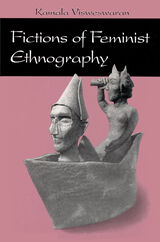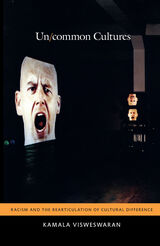2 books about Visweswaran, Kamala

Fictions Of Feminist Ethnography
Kamala Visweswaran
University of Minnesota Press, 1994
Although feminist ethnography is an emerging genre, the question of what the term means remains open. Recent texts that fall under this rubric rely on unexamined notions of "sisterhood" and the recovery of "lost" voices. Writing about her work with women in Southern India, Kamala Visweswaran addresses such troubled questions in the essays that make up Fictions of Feminist Ethnography. Blurring distinctions between ethnographic and literary genres, the author employs the narrative strategies of history, fiction, autobiography and biography, deconstruction, and postcolonial discourse to reveal the fictions of ethnography and the ethnography in fiction. In the process of reflecting on the nature of anthropology itself Visweswaran devises an experimental approach to writing feminist ethnography.
What sets this work apart from other self-reflexive feminist ethnographies is its rigorous engagement with the concrete inequalities, refusals, and misunderstandings between the author and the women she worked with in India. In each essay, she takes up the specific ellipses of power differentials in her field research and works out their epistemological consequences. The result is a series of contextualizations of the politics of identity in the field, at "home," and within the lives of women who particpated in the Indian nationalist movement. We learn in lucid detail about the partiality of knowledge and the inevitable difficulties and violations involved in representing the lives of women, both inside and outside the United States. Clearly and forcefully written, this book should be of interest not only to anthropologists but also to cultural theorists and critics, feminist scholars and writers, and other social scientists who grapple with epistemological and political issues in their fields.
"Fictions of Feminist Ethnography is an ambitious, experimental, comprehensive and learned book directed at a professional (anthropological) audience. I find the book thought-provoking and highly recommendable because of the sensitive, critical and sometimes even surprisingly innovative handling of 'data'. In addition to the sharp analyses, it succeeds in elegantly combining form and content, and in mastering the unification of literary criticism with identity politics and a sophisticated feminism." Folk - Journal of Danish Ethnographic Society
"The text provides an excellent resource for thinking about what constitutes 'reading,' 'writing,' and 'researching' from a feminist ethnographic positioning." Journal of Contemporary Ethnography
"In reaching beyond traditional ethnographic form, Kamala Visweswaran places her own style of feminist ethnography at the nexus of feminist anthropology and literature-in the forms of autobiography, personal narrative, fable and fiction. By working through these 'experimental' forms Kamala Visweswaran puts her own theories of feminist ethnography into practice, calling traditional positivist ethnographic form into question, as well as the rather limited definitions of current experimental ethnography." Cross Cultural Poetics
Kamala Visweswaran is an assistant professor of anthropology in the graduate faculty at the New School for Social Research.
[more]

Un/common Cultures
Racism and the Rearticulation of Cultural Difference
Kamala Visweswaran
Duke University Press, 2010
In Un/common Cultures, Kamala Visweswaran develops an incisive critique of the idea of culture at the heart of anthropology, describing how it lends itself to culturalist assumptions. She holds that the new culturalism—the idea that cultural differences are definitive, and thus divisive—produces a view of “uncommon cultures” defined by relations of conflict rather than forms of collaboration. The essays in Un/common Cultures straddle the line between an analysis of how racism works to form the idea of “uncommon cultures” and a reaffirmation of the possibilities of “common cultures,” those that enact new forms of solidarity in seeking common cause. Such “cultures in common” or “cultures of the common” also produce new intellectual formations that demand different analytic frames for understanding their emergence. By tracking the emergence and circulation of the culture concept in American anthropology and Indian and French sociology, Visweswaran offers an alternative to strictly disciplinary histories. She uses critical race theory to locate the intersection between ethnic/diaspora studies and area studies as a generative site for addressing the formation of culturalist discourses. In so doing, she interprets the work of social scientists and intellectuals such as Elsie Clews Parsons, Alice Fletcher, Franz Boas, Louis Dumont, Claude Lévi-Strauss, Clifford Geertz, W. E. B. Du Bois, and B. R. Ambedkar.
[more]
READERS
Browse our collection.
PUBLISHERS
See BiblioVault's publisher services.
STUDENT SERVICES
Files for college accessibility offices.
UChicago Accessibility Resources
home | accessibility | search | about | contact us
BiblioVault ® 2001 - 2024
The University of Chicago Press









